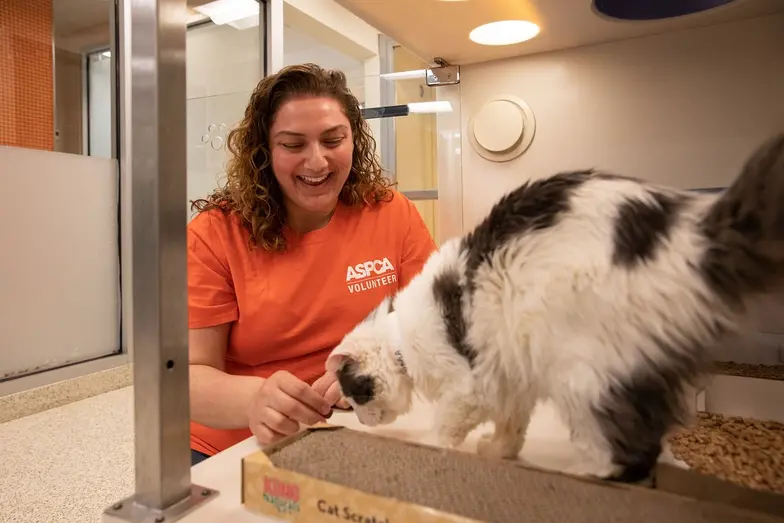Volunteer Passports: The Gateway to Shelter Support

In 2019, the ASPCA Adoption Center launched its Shelter Support program for volunteers based on a simple training tool—a volunteer passport.
“Overall, shelter support is where our greatest needs are,” says Julie Sonenberg, senior manager of volunteer engagement. “It’s the dirty work. On our volunteer application we’re basically asking, ‘Can you roll up your sleeves and do this work? Can you work outside your comfort zone?’ We know these tasks are unglamorous, but it’s where volunteers can help the most and we are upfront about it.”
With over 400 active volunteers, the ASPCA Adoption Center typically sees around 200 volunteers monthly, with 100 focusing on Shelter Support tasks such as general maintenance (GM) (spot cleaning of cat condos and dog kennels), dishwashing, and laundry. The other 50% of volunteers contribute to administration work, dog walking, cat socialization, and other duties.
While volunteer attendance varies across the spectrum of activities offered, the ASPCA recommends three, 3-hour Shelter Support shifts per month so volunteers are there regularly enough to be effective and efficient.
Ruth Allen, director of admissions and placement at the ASPCA Adoption Center, created the original volunteer passport for the ASPCA’s Kitten Nursery team nearly 10 years ago with input from staff. Since then, this road map has helped hundreds of volunteers navigate their training alongside staff and volunteer mentors who show them how to perform their duties.
A Two-Way Communication Tool
The passport itself is simple: a single sheet of paper with an introduction and checklists for 7 categories like “Kitchen” and “Organization.” Each category contains a list of tasks like “restocking and prepping treat bins” or “sorting linen donations” and boxes to check off volunteer progress in learning and facilitating each task. “The passport documents if a volunteer has learned the task, can demonstrate it, and is proficient at it,” says Julie.
Cynthia Thrash, director of animal welfare, considers the passport a two-way communication tool between new shelter support volunteers and the staff’s integrated care assistants (ICAs). “Volunteers refer to the passport during their shifts to identify areas where they need training,” says Cynthia. “It’s especially useful at the start of their journey.”
“For example, if ICAs are busy but note that a volunteer’s passport indicates that they are proficient in GMing a cat condo, they may ask a volunteer, ‘Could you GM this cat room?’” says Julie. “We also encourage volunteers to be proactive and ask for specific training during lulls in their shift.”
Volunteers receive their passports at orientation and store them onsite at the shelter so they can retrieve them at the beginning of each shift. At the end of their shift, a volunteer mentor or ICA staff member signs off on what tasks they performed that day.
“We are always transparent in outlining the tasks we need volunteers to learn and how we will support them. Any shelter could use some version of this tool.”
Useful In Multiple Ways
Because shelter support priorities fluctuate daily, the passport is useful in practical circumstances.
“Our team may look at a passport to see if a volunteer has learned a task they can complete independently without a mentor present,” says Julie. “Like doing laundry on an 8 a.m. shift.”
The passport is a fluid document that is adjusted periodically with recommendations from staff, mentors, and volunteers.
“Most tasks are simple enough to follow for first-timers and impact the shelter on a day-to-day basis,” says Alejandro Acosta, a volunteer who has mentored for close to half of his 2 years with the ASPCA. “Plus, there's a lot of variety. I think our volunteers look forward to trying new things while also improving their existing skills."
“Some volunteers appreciate the checklist format, which encourages them to seek out and complete tasks repeatedly to demonstrate mastery,” he adds. "But I always tell new volunteers not to feel rushed through every area. We want them to take their time and be open to learning new things. The goal is to make them feel empowered as part of a self-guided tour for their training.”
The passport also helps staff identify rising stars and mentors who can support the ASPCA’s operations more deeply. “It’s a connecting tool that applies structure,” says Eileen Hanavan, interim senior director of operations. “For new volunteers, it provides a sense of stability and clarity. It demystifies our process. We are always transparent in outlining the tasks we need volunteers to learn and how we will support them. Any shelter could use some version of this tool.”
Downloads
Download AllWe have lots more on this subject: